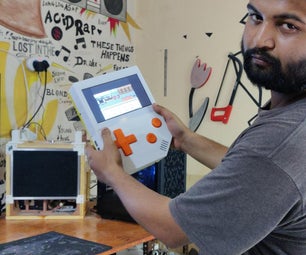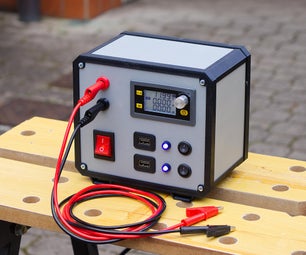Introduction: Mini Bench Power Supply - Vintage Style
I've had too many requests about my mini power supply, so i made instructable for it.
I’m in a progress of building new 2 channel power supply, but due to ongoing pandemic the shipping is slow and items keep disappearing. Meanwhile i decided to build temporary and easy PS from parts i had already laying around.
Main goals where:
- Easy to build
- Cheap parts and modules
- Easy to upgrade and modify
- Look nice on the workbench
Step 1: Main Components
80W DC-DC Buck converter module - Aliexpress
7in1 OLED Multifunction Tester - Aliexpress
External Power Adapter 12v/24v - Aliexpress
Multiturn Potentiometers (1x100k, 1x1K) - Aliexpress
16mm metal push button with LED (12v/24v) - aliexpress
Toggle Switch (6pin for extra indicator) - Aliexpress
Output terminals to your liking. I added DC jack and speaker terminals just in case. Outputs are all connected.
Banana Terminals - Aliexpress
DC jack - Aliexpress
Speaker Terminal - Aliexpress
I like to see, if power is connected to output, so i used extra indicators. Any led will do, but i had some nice looking indicators so i used those.
Indicator LED - Aliexpress
Depending on your indicator/LED you might need to use current limiting resistors.
Standard led > 470 OHM for 12V input power, 1.2 Kilo-ohm for 24v.
It's good to add extra security layer by using somekind of fuse. I used standard 5x20 mm fuse.
Fuse holder - Aliexpress
Step 2: The Encasement
I love woodwork so in my case my encasement is made from wood. I used scrap pieces of oak glulam i had. Some sawing, routering, drilling and sanding later i had myself simple, but nice looking box. I used router to give it rounded appearance, something like vintage devices/radios had.
I used teak oil as finish, added some rubber feet to raise it a little and sop it slipping and finally used furniture vent hole covers i found online.
Vent covers - Aliexpress
Step 3: Front and Back Panels
I designed my panels in illustrator. Tried to imagine the panel's design and ergonomics. Tried many many layouts until i got to the point i was almost happy. It's good to print it out and see layout in it's actual size/proportions.
If happy with the design you can use printout as a template to mark your drill holes etc.
In my case panels are made out of scrap acrylic glass. Sanded and spray-painted with black matte color.
Step 4: Electronics - Buck Converter
80w DC to DC Buck Converter (qs-1212ccbd-80w) is at the heart of this power supply.
It's cheap, has some useful features and works well for this type of a device.
It keeps constant current and voltage, has short-circuit protection, over heating protection and adjustable under voltage protection. Can be used to charge different types of batteries. What more can you ask from module that costs less than 4.- EUR?
We have to modify a little to ise it in our project though:
1. Remove/desolder potentiometers for 'Constant Current' and 'Constant Voltage'
2. Solder pin headers or wires for new potentiometers.
3. Optionally you can bring out the indicator LED's to the front panel as well. I soldered some pin headers for LED's as well.
I used multiturn potentiometers for better accuracy. 1K ohm for CC and 100K ohm for CV.
Step 5: Electronics - Final Assembly
In my case i used 12V input power, bu you can use 24v as well, just keep in mind LED current limiting. I used external power supply to keep encasement dimensions smaller.
Input power is used to power buck converter, indicator LED's, power button LED and Amp/Volt meter. There is 3A fuse between input and power on/off switch as well.
Buck converter's output is connected through multimeter to toggle switch. I use 6 pin toggle switch so it can power the output and indicator LED separately.
I used 3 different connector at the output jus in case. Bananas, speaker terminal and DC jack, but i never used anything other than a bananas :)
Most of the connections are made using spade connectors or dupont wires (+ one wago connector). It's easier to modify, upgrade or fix the power supply this way.
Step 6: Conclusion
At first i thought that i over designed the power supply, especially as it was meant for temporary power supply. But now I'm happy that i spent some extra time on the design and smaller details. It looks nice on my workbench, everyone always asks about it, and by now i built all my other tools in the same style/design key.
I'm using it almost daily for small test and experiments and had no issues with it. Ive been using it for 6 months now, so not so temporary after all (still waiting for some parts for my new large power supply).

Participated in the
Build a Tool Contest









![Tim's Mechanical Spider Leg [LU9685-20CU]](https://content.instructables.com/FFB/5R4I/LVKZ6G6R/FFB5R4ILVKZ6G6R.png?auto=webp&crop=1.2%3A1&frame=1&width=306)



